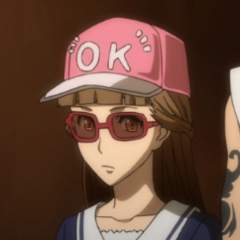-
Posts
313 -
Joined
-
Last visited
-
Days Won
9
Reputation Activity
-
 alpacaman got a reaction from Timmy in Saya no Uta Review
alpacaman got a reaction from Timmy in Saya no Uta Review
Great review! I'd love to read more of your thoughts about the themes as these are something most VN reviews don't really bother with. I wouldn't expect too much feedback though as sadly there isn't that much traffic on this forum anymore.
I have two points where I disagree with you too some degree though: Firstly, yes the side characters aren't fleshed out at all, but I'd argue this is on purpose since the story is very much told from Fuminori's perspective and he perceives anyone except for Uta as not even human and thus not really worthy of being acknowledged as having any depth beyond what you can observe on a surface level. Switching viewpoint characters serves mostly to exposition and develop plot and themes as well as grounding the reader. Even Uta is mostly portrayed as someone whose only purpose is to provide Fuminori pleasure. He doesn't care all that much who she is or what her gets out of their arrangement as he is too caught up in the pleasure/pain dichotomy you mentioned above. That's why Uta gets introduced with a sex scene and probably why there's the otherwise completely pointless rape scene with the neighbor but very few scenes where Fuminori asks her about anything not relevant to their immediate circumstances (at least if I remember correctly, it's been a couple of years since I read the VN).
Which brings me to my second point, the sexual content. I agree most of it gratuitous and pointless as well, the first scene with Yoh stuck with me though. It marks the point of no return for Fuminori in terms of morals. Each prior crime of his could be, to some extend, excused with him trying to protect himself and/or Uta. But in this scene he brutally violates someone not only without prior provocation, but he even chooses the one person from the other side who has remained the most sympathetic to him throughout his mental deterioration as his target or at very least readily approves this choice (again, it's been a few years). He figuratively and literally dehumanizes Yoh. He doesn't see other humans deserving of any basic dignity any more, and this is the scene where this shift becomes evident.
-
 alpacaman got a reaction from Zalor in Blog: Why is everyone reading Umineko the "wrong" way? [spoilers]
alpacaman got a reaction from Zalor in Blog: Why is everyone reading Umineko the "wrong" way? [spoilers]
I don't know if I would go as far as the anon in my praise of Umineko. I agree with the general sentiment that Umineko has a narrative complex enough to hold up even when compared to some of the best pieces of literature though. I heavily disagree with his point about using the original sprites though.
If I interpret Umineko's message somewhat correctly this approach qualifies just as much as reading "with love" as my attempts at decoding its symbolism does, because you're acknowledging the work and passion Ryukishi07 put into coming up with so many elaborate murder mysteries. I feel a bit unhappy with the way I framed my argument around the terms "right" and "wrong" and how I used them in the context of Umineko because it comes across as if I'm trying to scold people for enjoying the mystery aspect of the VN, so I edited the paragraph after the Steins;Gate example to explain more precisely what I'm trying to get at. I hope the new version makes this clearer. I also put the "wrong" in the title in quotation marks.
-
 alpacaman reacted to kokoro in Blog: Why is everyone reading Umineko the "wrong" way? [spoilers]
alpacaman reacted to kokoro in Blog: Why is everyone reading Umineko the "wrong" way? [spoilers]
Umineko is first and foremost a tale about how the public view on a tragic event can hide one own's feelings, which I think is more important than an objective truth.
The plot about Yasu is secondary to me. I read Umineko expecting something like Higurashi, but I found something different. Basically a deconstruction of Higurashi and the mystery genre too.
I'm glad I read it.😅
-
 alpacaman got a reaction from Mr Poltroon in Blog: Why is everyone reading Umineko the "wrong" way? [spoilers]
alpacaman got a reaction from Mr Poltroon in Blog: Why is everyone reading Umineko the "wrong" way? [spoilers]
I don't know if I would go as far as the anon in my praise of Umineko. I agree with the general sentiment that Umineko has a narrative complex enough to hold up even when compared to some of the best pieces of literature though. I heavily disagree with his point about using the original sprites though.
If I interpret Umineko's message somewhat correctly this approach qualifies just as much as reading "with love" as my attempts at decoding its symbolism does, because you're acknowledging the work and passion Ryukishi07 put into coming up with so many elaborate murder mysteries. I feel a bit unhappy with the way I framed my argument around the terms "right" and "wrong" and how I used them in the context of Umineko because it comes across as if I'm trying to scold people for enjoying the mystery aspect of the VN, so I edited the paragraph after the Steins;Gate example to explain more precisely what I'm trying to get at. I hope the new version makes this clearer. I also put the "wrong" in the title in quotation marks.
-
 alpacaman reacted to Zalor in Blog: Why is everyone reading Umineko the "wrong" way? [spoilers]
alpacaman reacted to Zalor in Blog: Why is everyone reading Umineko the "wrong" way? [spoilers]
Unironically this is why I've often described Suba Hibi and after reading Umineko, Umineko as well as the VN equivalent of literary works like Infinite Jest and Ulysses. Not because the themes or writing styles have anything in common with those books, but because all of them are works that are long and demand you think about them after you finish reading them. They play around with your expectations, but reward you for patience (as well as severely test your patience). I saw it said best on a thread on 4chan a while back, and I'll attach my screenshot of what that Anon said:
-
 alpacaman got a reaction from Mr Poltroon in Blog: Why is everyone reading Umineko the "wrong" way? [spoilers]
alpacaman got a reaction from Mr Poltroon in Blog: Why is everyone reading Umineko the "wrong" way? [spoilers]
My guess is most readers fall somewhere in the middle between this and what I described above. I don't think we are very far apart on this actually and I admit I kind of failed to highlight the battle of wits aspect. It is definitely one of the things that make up a major part of the charm of the mystery genre. I'd still argue the fun in this kind of confrontation lies in the reader knowing the playing field and having a grasp on the basic rules and trying to figure out which "loophole" or which possibly tiny part of the puzzle the opponents are going to use to corner each other (I'm seriously jumbling metaphors here). It isn't just the "smart" part, it is that the solution is something you could found out yourself. The "ah, so that's what that clue was about" moment is very important imo. For example, a VN about Einstein fighting other leading scientists over the interpretation of certain aspects of quantum physics could be fun in its own way, but it would be very different from a Sherlock Holmes story.
-
 alpacaman reacted to Mr Poltroon in Blog: Why is everyone reading Umineko the "wrong" way? [spoilers]
alpacaman reacted to Mr Poltroon in Blog: Why is everyone reading Umineko the "wrong" way? [spoilers]
Not to discount your initial premise or the entire post, because I think what I will say won't disprove it or anything, but I'm somewhat willing to bet that the majority of people that read Umineko for the first time do not fit into the pattern you have described.
Many, including myself, who are fans of the mystery genre are not actually interested in solving the mysteries. The interest is in having characters be smart and do it all for us so we can be amazed. This particular type of reader is often kicked in the shin by Umineko which does not actually bother to solve its mysteries, and even when it does, it does not do so correctly*. Indeed, the novel itself dedicates many of its scenes to giving the readers clues and trying to get them to actually think and try to solve the mystery. Many of the scenes where meta Battler is alone introspecting or talking with someone else as an aside of the main plot it can often be them encouraging him to try and solve things or explaining why it's not an impossible task.
In light of all this, it is very difficult for me to swallow that the novel did not intend to have you read it as a mystery at the start. Thankfully that isn't quite what you said and I ultimately agree that whilst the novel wants you in mystery-solving mode for the tale it wants to tell, that mode isn't the one that'll get you to the truth/meaning/whatever of the scenes.
On the topic of my own replay, I leaned heavily into the mystery-solving aspect for my readthrough because I didn't try to solve anything my first way through, and by the end the game does give you the key pieces of info to put things together. Still, most of the more abstract scenes I do "ignore" from a mystery solving perspective even now, choosing to read them purely as character moments. I don't have it in me to try parsing them in any other way.
*Which does not matter, because to somebody who isn't solving things, there are a tremendous amount of scenes of "awesome music is playing and this character might be doing something amazing" when they actually are not (Battler's the master nothing-doer while looking awesome). This works to amaze inattentive people anyhow, so Umineko's not so bad even from this perspective.
-
 alpacaman got a reaction from Zalor in Umineko's opening scene
alpacaman got a reaction from Zalor in Umineko's opening scene
With Bernkastel's name it makes total sense for her to like alcohol (since she shares her name with a small German town mostly known for its wine), although I don't really know yet how it would fit into an overarching booze=fantasy motif since she's the antagonist to the pro-fantasy faction. Maybe there's more of a general drinks motif going on. There's also the thing with the tea Rosa bought for Kumasawa I had totally forgotten about and I don't remember what that was all about. I don't know, I should probably stick to reading and making notes for now before I make theories based on stuff I only half-remember.
-
 alpacaman reacted to Zalor in Umineko's opening scene
alpacaman reacted to Zalor in Umineko's opening scene
Glad to see that the Umineko discussion thread inspired relooking at the VN. @Mr Poltroon's post in the thread was great to read through, and likewise its interesting to relook at the opening scene. Personally when I first read the opening scene, I remember wondering why it started this way. Looking back at it in retrospect it makes more sense though. Especially once you have a greater understanding and context of who Kinzo really is, and his role in the rest of the story.
I'm interested in the observation in whether alcohol holds any consistent motif or not. Off the top of my head I know that Bernkastel is quite fond of good alcohol and so is Beatrice. In fact there are some pretty great scenes of Beatrice getting drunk. But I don't know if that's relevant to your curiosity around the use of alcohol.
-
 alpacaman got a reaction from Dreamysyu in The Grisaia Series is Kind of Genius
alpacaman got a reaction from Dreamysyu in The Grisaia Series is Kind of Genius
I felt like the things you criticise about the sequels (which I haven't read) are already visible in the original. The girls all being in love with Yuuji and his cum/superpowers healing their mental wounds and so on. That there is no harem route in the original doesn't mean there is ever any doubt that he is the harem master.
Grisaia isn't as much a subversion of anime/eroge tropes but rather a darker and edgier iteration. I don't buy that it's supposed to be a parody of certain clichés, as their overexaggeration rarely ever says anything about them. Yumiko trying to kill Yuuji does nothing to expose inherent problems with the "unapproachable heroine" trope or how it's typically handled through way of comedy, it just takes said trope and turns it up to eleven.
If anything I'd say Grisaia imo actually takes the whole eroge formula to its cynical conclusion. There are the incapable heroines, only this time they are total emotional wrecks. The self-insert protagonist is the only one capable of solving their problems, only in Grisaia he is a super soldier because because the development team realised that a high proportion of the target audience reads these stories to play out a certain kind of power fantasy and Yuuji embodies this completely.
-
 alpacaman got a reaction from Gibberish in The Grisaia Series is Kind of Genius
alpacaman got a reaction from Gibberish in The Grisaia Series is Kind of Genius
I felt like the things you criticise about the sequels (which I haven't read) are already visible in the original. The girls all being in love with Yuuji and his cum/superpowers healing their mental wounds and so on. That there is no harem route in the original doesn't mean there is ever any doubt that he is the harem master.
Grisaia isn't as much a subversion of anime/eroge tropes but rather a darker and edgier iteration. I don't buy that it's supposed to be a parody of certain clichés, as their overexaggeration rarely ever says anything about them. Yumiko trying to kill Yuuji does nothing to expose inherent problems with the "unapproachable heroine" trope or how it's typically handled through way of comedy, it just takes said trope and turns it up to eleven.
If anything I'd say Grisaia imo actually takes the whole eroge formula to its cynical conclusion. There are the incapable heroines, only this time they are total emotional wrecks. The self-insert protagonist is the only one capable of solving their problems, only in Grisaia he is a super soldier because because the development team realised that a high proportion of the target audience reads these stories to play out a certain kind of power fantasy and Yuuji embodies this completely.
-
 alpacaman got a reaction from Plk_Lesiak in Rainbow Dreams (Western VN Review)
alpacaman got a reaction from Plk_Lesiak in Rainbow Dreams (Western VN Review)
Oh boy...
Now I'm really curious what their other titles are like.
-
 alpacaman got a reaction from Dreamysyu in The nature of an infodump
alpacaman got a reaction from Dreamysyu in The nature of an infodump
I think infodumps at the beginning are rarely employed because there is no in-story-conflict yet readers can connect it to. At least to me they feel more like homework than useful information most of the time and I tend to get bored before the actual story even begins.
A way of infodumping that's rather unique to VNs that can be rather effective is adding opportunities for expositioning outside of the actual story. For example an encyclopedia can be a good way of explaining things characters in-universe wouldn't talk about normally without taking you out of the story for too long. 428 utilizes this feature brilliantly, adding funny side stories to its exposition and even secretly setting up plot devices. VA-11 also has an approach I really like where you read news stories and internet boards inbetween story-sections (although admittedly it's used more for world building than infodumping).
-
 alpacaman got a reaction from Plk_Lesiak in The nature of an infodump
alpacaman got a reaction from Plk_Lesiak in The nature of an infodump
Yeah, I think there are worse ways to do exposition than dumping it right at the start, and I know quite a few TV shows and movies that do this and are still quite good. It's just very hard to do in a way that keeps the reader invested enough that they remember the important information. As for the encyclopedia thing, I don't think reading an encyclopedia entry is worse than a wall-of-text dump or some character monologueing exposition, at least as long as it's not information that's new to the protagonist. Of course none of these options should be the primary way of expositioning, as imo a story should always try to tie every important piece of information to its characters' motivations or its themes or whatever makes sense through a scene where something actually happens imo, but if that's not possible or highly inconvenient, putting it outside the main text often is a better choice imo.
Do you think this particular VN could have gotten a good prologue when the writers weren't able to write an encyclopedia that actually explains things?
-
 alpacaman reacted to Plk_Lesiak in The nature of an infodump
alpacaman reacted to Plk_Lesiak in The nature of an infodump
Well, of course a prologue wouldn't work in a mystery horror story, but that's not what I was talking about. It's particularly meaningful for high-concept fantasy and sci-fi world that can be confusing to the player if it's not explained properly. Giving just enough context to make it comprehensible at the beginning, and minimize the need for infodumps when the action picks up pace is pretty optimal. In the case of your story, I simply think it could've done with a lot less info in general. I'd like it more being vague than just explaining the lore this way.
That is a good point, but if you think of it as another method of "scattering" the infodumps to keep the complexity of the world without creating the walls of info in the middle of the story it should still be worth it. I also don't like encyclopedias if they contain information actually crucial to understanding the story – as you said, it can be cool for fleshing out your world, but it can't be a primary method.
...I might also be speaking from one specific trauma of an EVN with a world that was pretty much incomprehensible because of lack of proper exposition, and with encyclopedia which created more questions than it answered. A good prologue could've done miracles for that game.
-
 alpacaman got a reaction from Arcane City Game Studios in The nature of an infodump
alpacaman got a reaction from Arcane City Game Studios in The nature of an infodump
I think infodumps at the beginning are rarely employed because there is no in-story-conflict yet readers can connect it to. At least to me they feel more like homework than useful information most of the time and I tend to get bored before the actual story even begins.
A way of infodumping that's rather unique to VNs that can be rather effective is adding opportunities for expositioning outside of the actual story. For example an encyclopedia can be a good way of explaining things characters in-universe wouldn't talk about normally without taking you out of the story for too long. 428 utilizes this feature brilliantly, adding funny side stories to its exposition and even secretly setting up plot devices. VA-11 also has an approach I really like where you read news stories and internet boards inbetween story-sections (although admittedly it's used more for world building than infodumping).
-
 alpacaman got a reaction from Plk_Lesiak in An attempt at classifying protagonists
alpacaman got a reaction from Plk_Lesiak in An attempt at classifying protagonists
I haven't read or watched anything from the Fate franchise, so I can't really comment on that.
As for comedy heavy VNs, if I remember correctly, at least the few ones I read had MCs who mainly acted as "straight man" characters, meaning someone who is more or less normal to contrast the absurd of the comedy and keep the audience from getting to accustomed to it. The useful idiot category kind of implies that the character's incompetence or ignorance is what drives the plot, which most of the time makes them part of the absurd (Phoenix Wright is a notable exception). There probably are useful idiot protagonists in some comedy VNs, I just imagine them being hard to include in anything with heroine routes, as heroines tend to be flashy as well and the risk of losing the comedic balance would be high.
You could argue that Rintaro from Steins;Gate fits the category as well (although I put him in the strong protagonist column in the diagram). It's mainly his chuuni persona and his curiosity driving the plot in the first half of S;G until at some point he is made painfully aware of the fact that he got himself into something way beyond his control.
-
 alpacaman reacted to Plk_Lesiak in An attempt at classifying protagonists
alpacaman reacted to Plk_Lesiak in An attempt at classifying protagonists
Wouldn't Fate's Shirou start as a full-on useful idiot, getting more competent over time?
Another thing coming to my mind are some protagonists in comedy anime, especially Konosuba's Kazuma. There would probably be some kind of equivalent of that in VNs?
-
 alpacaman got a reaction from Plk_Lesiak in The Different Treatment of Sex Scenes: Japan vs. America
alpacaman got a reaction from Plk_Lesiak in The Different Treatment of Sex Scenes: Japan vs. America
I think it has more to do with a different approach to fiction than being more open minded about sex. Most western magazines for women below a certain age contain sex advice and some cheap erotica like Fifty Shades of Grey can become a mega-seller in western countries. Japanese culture values personal space very highly and prying into someone elses business is considered impolite, so people don't complain about fiction they are not the intended audience for. And Japanese media seems heavily targeted at certain demographics. So when companies release a game or VN they think more about what the target audience wants than what is socially acceptable. Most Japanese young male shut-ins (as seems to be the way eroge-readers are seen) like porn scenes with their waifus so developers include them because they lead to higher sales and nobody who is not part of the target audience is going to complain, like it would happen in western countries. That doesn't mean there is no social stigma towards these things in Japan, it's just that it affects consumers (by getting socially isolated) of such media, not the creators.
As to why some voice actresses do porn scenes, my guess would be that it's hard to make a living in this job in Japan if you don't do it.
edit: Reading my post again I think I didn't get my point across that well. What I was trying to say is that in Japan disapproval against certain content doesn't show itself through public outcry since that would mean openly shaming consumers which would be considered overstepping your boundaries. Instead these consumers suffer from social stigma which has more subtle consequences.
-
 alpacaman got a reaction from Zakamutt in Cooking with Zaka: Lazy-ass pork wine stew
alpacaman got a reaction from Zakamutt in Cooking with Zaka: Lazy-ass pork wine stew
Every dish that is basically just meat cooking in its own juice is tasty as long as you don't add too much of the wrong ingredient because it contains plenty of everything that makes food taste satisfying: salt, fat and sodium glutamate (the bouillon only amplifies this in your recipe). And adding more complex notes like red wine or something smoky or spicy can turn a dish that's just satisfying into something really tasty.








